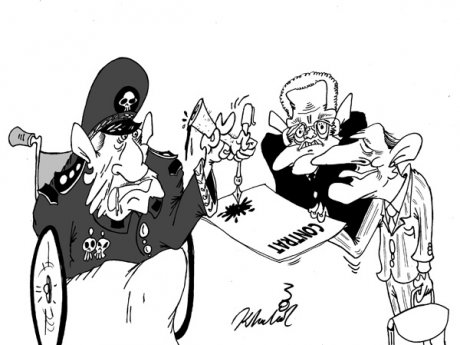
To sell submarines to Chile in 1997, Jacques Chirac and Lionel Jospin let the DCN call upon the services of one of General Pinochet’s closest consultant. And this juicy contract is still going on
During the end of the 2006, the Chilean submarines “le Carrera” left the Spanish boatyard in Cartagena towards Talcahuano in Chile. The construction of this boat was the result of a very successful cooperation between the French from the DCN and the Spanish from the Navantia group. The submarines finally arrived after an 8500 miles journey. It was the second of its kind to be delivered to the Chileans.

It was in spring of 1997 that this contract between French, Spanish and Chileans was signed. In France, the unfortunate dissolution of the National Assembly by Chirac gave the control of the government to Lionel Jospin and the socialists. In Chile, the friendly General Pinochet who had organized the bloody military coup d’état against Allende, wasn’t ruling anymore but was still the chief of the army. His influence as we will discover was still significant.
The two submarines delivered to Chile had never been experimented elsewhere. In these conditions, the contract was especially hard to get for the French and the Spanish. They called upon two consultants named Pedro Felix de Aguirre and Francesco Muzard. Both for their presumed efficiency, received gifts as we can see in the two contracts Bakchich was able to get (see below)


Bakchich wanted to know more about these two intermediaries. The first one Francisco Muzard is the son of a historical Gaullist and is today still one of the bosses of UMP in Latin America. More interesting is Pedro Felix de Aguirre’s career. He was a secretive man who was until Pinochet’s arrest in London, one of his biggest followers. Poor Aguirre has now disappeared, his son, a lawyer now takes care of most of his cases.
Pedro Felix de Aguirre Lamas’ face is unknown by most Chileans and he doesn’t appear in Google’s file or any other database. In the ‘80s, Pedro Felix’s friend appears in several companies in which Pinochet’s family has a part in. We also find some important officers of the “Fuerza Aerea” (Chilean Airforce). During the dictatorship, De Aguirre became wealthy with vine and weapons as a journalist from El Pais, Ernesto Ekaiser described in his book “Me Augusto”. Pedro Felix de Aguirre was especially close to Lucia Pinochet, Augusto’s elder sister, as well as his wife “Dona Lucia”. Nothing apparently to disturb our officers at the DCN who took contact with him.
He was the one who carried out discreet investigations for Pinochet on the degree of advancement of the Spanish judge’s investigation on the General. He tried to convince Pinochet that he had to discuss with the Spanish magistrate Garcia Castellon, a conservative who was willing to close the case, which the former dictator didn’t do.
Two Chilean judges Sergio Munoz and Juan Guzman were for a moment interested in the secrets that this entrepreneur and friend of the family knew about Pinochet’s fortune. But those two should have been more interested in the DCNI’s secret.
Pedro Feliz de Aguirre left some bad memories to his partners in France. We saw him having a fit against executives of the Canadian imperial bank of commerce (CIBC), who worked for the DCNI, calling the head office in Toronto, raving and informing on the delays in payments. A “rude person” explains a high ranked in the Ministry of Defense.
Since this Chilean contract, other submarines of the same model were sold by the French and the Spanish ; six to Malaysia and two to India. Yet, the Chilean middlemen who supported the sale of the first submarines are interested in the following sales as stated in a confidential document from the DCNI dated from December 17th 1997 and sent to the Chilean captain Alejandro Herrman Hartung. It is specified in that document that for every ship sold to another country, the Chileans would receive six million Francs. Enough to make ends meet at the end of the month, nothing more. As we will see in our next article, the blessed times of big contracts and commissions are over.
In terms of weaponry, France has had at times some disreputable middlemen : General Paul Aussaresses has noticed as he tells it in his last book “Je n’ai pas tout dit” (I haven’t said everything). The best parts were published in “L’Express” last April.
The General with the black band, told how when he was given the responsibility by French weaponry companies to prospect for new contracts in Bolivia in the ‘70s, he met Klaus Barbie by chance at La Paz, the capital of Bolivia, who was a former officer of the Gestapo wanted by the justice. He worked with defense companies and groups and makes a living as a middleman. Revelations from Aussaresses : “France delivered a nice amount of cannons to Bolivia thanks to Klaus Barbie’s work. And Barbie received commissions from France”. He concluded : “I don’t want to be in bad terms with the Giat (the tank constructor) but that was bad”.
Yes Aussaresses said it !
To read the first 4 episodes of our investigation :
Translated by Jacky Chen
